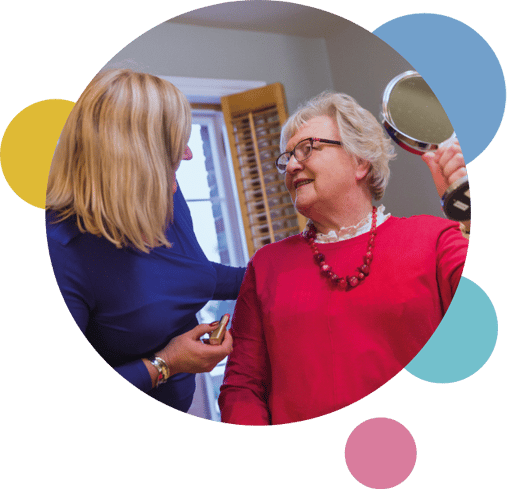Why is dementia more common in women?
The reasons why dementia occurs more often in women are not fully understood. It is likely due to a combination of genetic, anatomical and even societal factors.
One explanation is that dementia risk increases with age. Although the ageing process itself does not cause dementia, as people get older their risk of developing dementia increases. Since women typically live longer than men, they are more at risk.
Research also suggested that the female hormone oestrogen could play a role in dementia risk. Researchers believe that oestrogen may cause the body to create more antioxidants which protect the brain from damage. After menopause, women’s oestrogen levels naturally decrease, which may make them more vulnerable to dementia.
Societal factors may also play a role. Some studies have shown that memory decline seems to be more prevalent among women that have never worked outside of the home. However, future studies are needed to fully explore the links between employment and brain health.
The early signs of dementia in women
There are many different types of dementia and they affect people in different ways. Every person with dementia will experience symptoms in their own way.However, there are some common dementia symptoms in women that often appear before a dementia diagnosis. These symptoms include:
Memory loss
One of the earliest signs of dementia is memory loss. While everyone forgets things from time to time, memory loss that affects everyday life can be a sign of dementia. A person with dementia may frequently find it difficult to remember what day it is, what they did yesterday or recent events.
Language difficulties
Everyone struggles from time to time to find the right words, but a person with dementia may forget simple words or substitute unusual words making it difficult to understand what they are trying to communicate. They may also need help understanding others.
Personality changes
Everyone can experience periods of agitation or irritability, but people with dementia may experience sudden changes in mood for no apparent reason. Your loved one may start to exhibit behaviours that are different from their usual personality. It is important to discuss these changes with their GP as they can also be signs of other conditions such as depression or anxiety.
Lack of initiative
It is normal to tire of certain activities or feel unmotivated from time to time. However, if your loved one becomes unusually passive, suddenly loses interest in activities they once enjoyed or starts sleeping more frequently, it can be an early sign of dementia.
Difficulties with daily tasks
People with dementia face difficulties with familiar tasks such as getting dressed or telling the time. If your loved one is finding it difficult to complete everyday tasks in the way they once did, it may be a sign of dementia.
Disorientation
A person with dementia may have difficulty finding their way to familiar places or they may become confused as to where they are. It is also common for a person with dementia to be confused day and night.
What to do if you notice these signs in a loved one
Dementia is not a normal part of ageing, so if you notice any of these early signs in your loved ones it’s important to speak to their GP. A GP will be able to help you get an accurate diagnosis of the symptoms your loved one is experiencing.
Your GP will examine their symptoms, family history and medical conditions. They may request additional exams like blood work. If they do suspect dementia, your loved one will be referred to a specialist for a medical assessment.
Although a dementia diagnosis can be daunting and difficult to process, know that it does signal the end of life or that you are powerless against the disease. There are many treatments available that can slow the progression of the disease and help you maintain your way of life.
Dementia resources for women
To support you and your family, we have created a practical Dementia Care Guide which provides information and advice on how to provide person-centred dementia care following a diagnosis of dementia.
There are many resources on living well with dementia available at Dementia UK. They also have a national dementia helpline on 0800 888 6678. This helpline is managed by Admiral Nurses that will listen to you and give advice, support and information.
Here you can find more guidance on the leading dementia charities across the UK.
How dementia care at home can help
If you or a loved one has been diagnosed with dementia, you may feel your only option to receive the care you need is to move into residential nursing or care home. While this may be a suitable option for receiving dementia care, leaving the comfort and familiarity of home is often confusing and distressing for people with dementia.
Live-in care allows your loved ones to receive the high-quality dementia care they need whilst being able to stay in their much-loved home. A highly-trained and well-matched carer will move into their home and provide one-to-one care and support. With the gentle encouragement and support of a professional carer, people with dementia can continue thriving at home despite the challenges presented by dementia
The Good Care Group has been innovating live-in dementia care for over 10 years. Our professional and compassionate carers are well-versed in a wide range of best dementia care practices designed to comfort and reassure your loved one, reduce stress and anxiety, and facilitate better communication.
We are dedicated to supporting people with dementia and their families with our award-winning dementia care at home. Do not hesitate to contact us to discuss your dementia care needs with our friendly and approachable team.
Talk to us about your care needs
To talk about your care needs, contact one of our friendly advisors. Calls from landlines are free.

